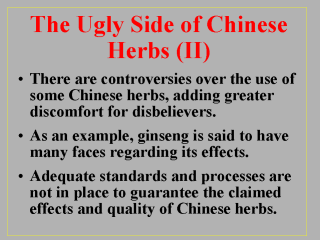| front |1 |2 |3 |4 |5 |6 |7 |8 |9 |10 |11 |12 |13 |14 |15 |16 |17 |18 |19 |20 |21 |22 |23 |review |
 |
As with Western
medications and dietary supplements, there are controversies over the therapeutic
functions of many Chinese herbal medicines (CHM). These controversies add greater
discomfort for disbelievers of traditional Chinese medicine (TCM) in using CHM, whose
quality and safety are largely unregulated. The controversies over the use of ginseng is a
case in point. Some TCM practitioners believe that ginseng is a stimulant while others do not totally agree (see Slide 17). A few of them have even said that the herb has many faces. While mounting evidence supports the use of ginseng as a highly effective healer for numerous types of illnesses, many health professionals forewarn about the adverse or opposite effects that can be caused by long-term use of this herb. Also, by nature, the promotional literature tends to exaggerate the actual pharmaceutical functions of many CHM, especially since their sale and use are not subject to any stringent health regulation. For Westerners, an aspirin is an aspirin is an aspirin. In TCM, however, the therapeutic quality of ginseng is only as good as where, when, and how it is cultivated. Oriental ginseng typically does not have the same effectiveness or has different therapeutic effects than the American species. Also, ginseng’s root has different therapeutic properties than the other parts of the plant. The point of all these is that disbelievers are expected to remain skeptical about the merits of CHM until perhaps after adequate standards and processes are in place to guarantee these products’ claimed effects and quality. |